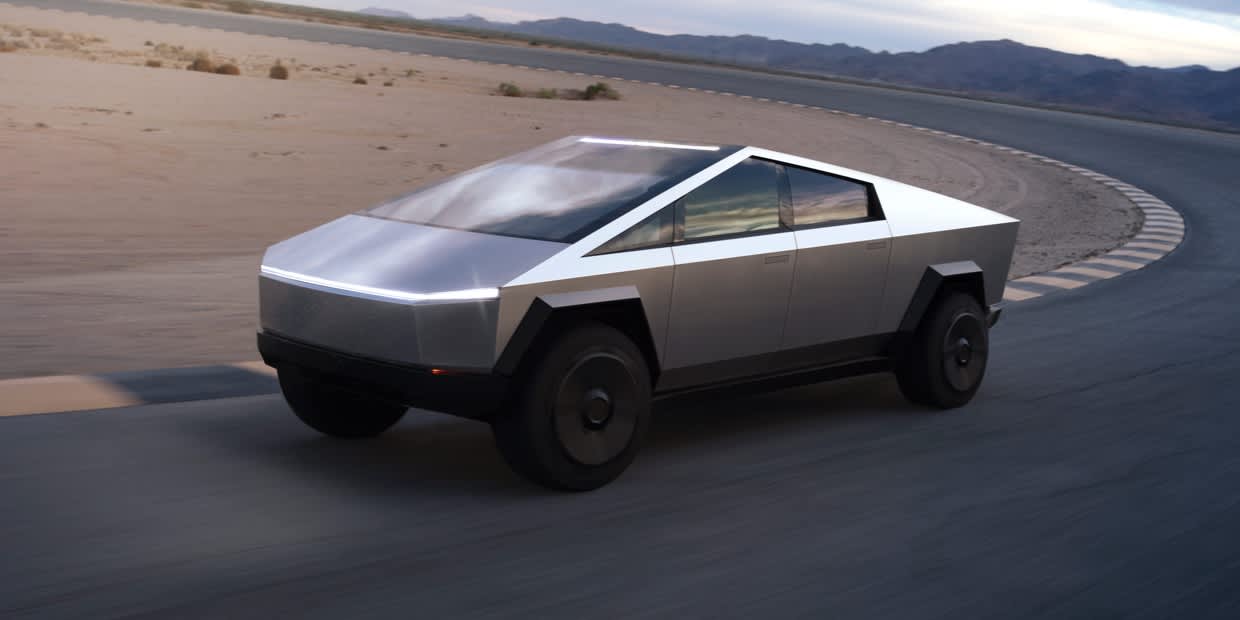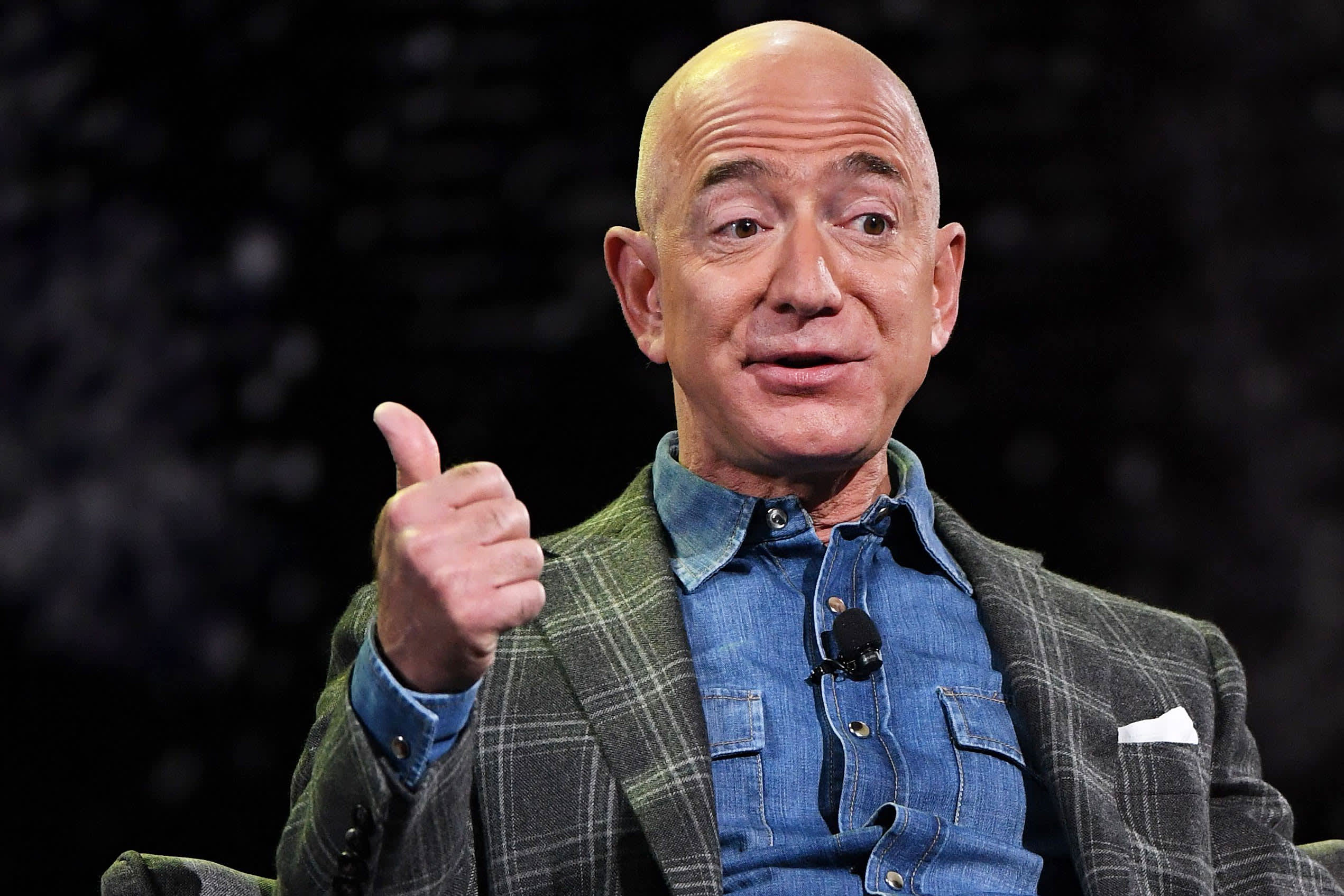Tesla Cybertruck: 5 important questions about the polarizing EV

Tesla CEO Elon Musk introduces the Cybertruck at Tesla's design studio Thursday, Nov. 21, 2019, in Hawthorne, Calif.
Ringo H.W. Chiu | AP
DETROIT — Tesla's Cybertruck pickup made its global debut Thursday night to roaring cheers, some criticism and sighs of relief from Detroit automakers.
The futuristic-looking pickup, resembling a large metallic trapezoid, was far from what many were anticipating. The vehicle has a polarizing design unlike anything ever produced outside of sci-fi movies, and its production process, as detailed during the unveiling by CEO Elon Musk, is expected to be more similar to that of a traditional car than a truck.
"Trucks have been the same for a very long time," Musk said during the unveiling at the company's design center outside Los Angeles. "Like a hundred years, trucks have been basically the same. We want to try something different."
Ahead of the truck driving onto the stage, Musk poked fun at the lack of design changes of pickups over the last century — specifically singling out pickups from Chevrolet, Ford and Ram brands, which account for the vast majority of pickup sales.
As Tesla's stock dropping 6% Friday indicates, major questions remain about the truck ahead of its expected production in late 2021, according to Wall Street and industry analysts. Here are some of them:
'Fashion and function'?
A hologram of a woman at the beginning of the unveiling called the truck "the greatest evolution in vehicular fashion and function," however, some are questioning both those assertions.
"Polarizing" has been the most common term for the vehicle's design, which was inspired by the movie "Blade Runner."
"Elon Musk has been enthusiastic about his Blade Runner inspired design for months, but we were still surprised how futuristic he went with this one and believe it may shatter his dreams," wrote Cowen analyst Jeffrey Osborne in a note to investors on Friday.
Tesla, according to Osborne, appears to have "rushed its launch of the Cybertruck," as many features such as side mirrors and windshield wipers were missing. The lack of those features and build quality of the vehicle have led some to believe the vehicle is a concept and not an actual production model.
As expected, the performance specifications of the truck are impressive, including a 0-to-60 mph time of as low as 2.9 seconds, towing capacity of more than 14,000 pounds and a top speed of 130 miles per hour. Cybertruck's EV range, depending on the model, is expected to vary from about 250 miles to 500 miles, according to Tesla.
A promotional shot of Tesla's Cybertruck.
handout
"While the Cybertruck seems plenty capable, we don't believe that Tesla is going after the heart of the market and the work/utility crowd here," wrote RBC Capital Markets analyst Joseph Spak in a note to investors on Friday.
Musk showed the Cybertruck beating the industry-leading Ford F-150 in a "tug of war" and outracing a Porsche 911.
Who's the buyer?
The Cybertruck is not expected to appeal to millions of traditional truck buyers, who last year accounted for nearly one in five vehicles sold in the U.S.
Cybertruck, according to analysts, is essentially in a segment of its own that may appeal to current Tesla customers and "the influencer crowd (celebrities and pop culture)," however, it will not be a mass-market vehicle.
"It will be a niche product at best and poses no threat in the pickup market as we know it today," said Matt DeLorenzo, senior executive editor at Kelley Blue Book.
RBC's Spak called the Cybertruck a "Hummer for the green millennial generation, really the ultimate virtue and vice signaling machine."
Tesla unveiled three models: A single-motor rear-wheel drive for $39,900, a dual-motor all-wheel-drive for $49,900 and a tri-motor all-wheel-drive for $69,900.
Tesla started taking reservations for Cybertruck on its website following the vehicle's unveiling. A $100 deposit is required.
Earth- or glass-shattering?
Trucks are supposed to be tough, but Tesla appears to be taking it to another level.
During the unveiling last night, the truck's "ultra-hard 30X cold-rolled stainless steel" body held up to what Musk described as a sledgehammer, and he said it can withstand a 9 mm bullet from a handgun. But things got a little awkward when it came time to show off the durability of the company's new "armored glass."
To demonstrate the toughness of the glass, Tesla Chief Designer Franz Von Holzhausen threw a metal ball at two windows. They shattered, to Musk's surprise, but the metal ball did not go through the glass.
"Oh my f------ God!" Musk said. "Well, maybe that was a little too hard."
Tesla co-founder and CEO Elon Musk stands in front of the shattered windows of the newly unveiled all-electric battery-powered Tesla's Cybertruck at Tesla Design Center in Hawthorne, California on November 21, 2019.
FREDERIC J. BROWN | AFP | Getty Images
Cowen's Osborne said in "a night to be remembered for the Armored Glass fail, Tesla's Cybertruck reveal will likely disappoint current pickup truck owners and we see the vehicle remaining a niche and not a mainstream product."
Musk also said the truck features an exoskeleton design that will use a production process more similar to a traditional "unibody" car than to a production process known as "body-on-frame" that's traditionally used for trucks.
Dan Ives of Wedbush Securities said the exoskeleton, which is made of a stainless steel alloy that Musk is using with Space X on its Starship rocket, is "the most impressive and eye popping part of the design."
Production?
It's unclear where Tesla plans to produce the truck. The company announced production is slated to begin in late 2021 but has not offered any details about where it will be produced.
Tesla did not immediately respond to requests for comment on production and other plans for the vehicle.
Automakers typically have dedicated truck plants, and the company's sole U.S. plant in Fremont, California, is not expected to have any additional capacity without an expansion to the facility.
The Tesla factory in Fremont, California.
Getty Images
Given Tesla's history of missed deadlines, the complexity of trucks and the fact that the company has never produced such a vehicle, production will be important.
"We remind investors Tesla does have a habit of being late on expected timelines," RBC's Spak wrote, citing a number of announced products that have yet to begin production for Tesla. "So while we don't doubt that Tesla will try to get the product to market, a large part of this event appears to be hype."
Competition?
While Cybertruck is not expected to appeal to traditional pickup buyers, several all-electric pickups are expected to make their way into the U.S. market to compete against Tesla's product.
General Motors CEO Mary Barra on Thursday confirmed the automaker plans to release an all-electric pickup in late 2021. That's around the same time Ford Motor is expected to release an all-electric version of its F-150 pickup.
Rivian's R1T pickup
Rivian
Start-up automakers such as Rivian and Lordstown Motors, which recently purchased a large assembly plant from GM, also are expected to release EV pickups in the coming years.
Rivian, which is backed by Amazon and Ford, plans to launch EV pickup and SUV models beginning in late 2020, followed by four additional products through 2025. The vehicles are expected to offer up to 400 miles of range and an "unmatched combination of off-road utility and high performance," according to the company.
Lordstown Motors on Thursday said it has started accepting preorders for its Endurance pickup, which is expected to be available in the fourth quarter of next year starting at $52,500.
— CNBC's Lora Kolodny contributed to this report.
Correction: A previous version of this story misspelled the name of RBC Capital Markets analyst Joseph Spak.
Read More

No comments